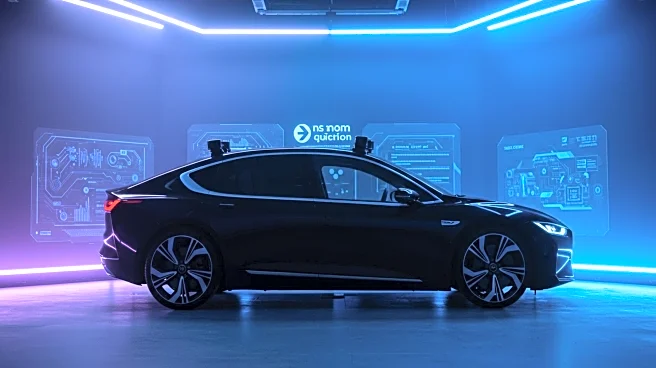What is the story about?
What's Happening?
Nuro, a Silicon Valley startup focused on self-driving software for delivery and ride-hailing services, has successfully raised $203 million in a Series E funding round. This round saw participation from Nvidia, Icehouse Ventures, Kindred Ventures, and Pledge Ventures, with Baillie Gifford, an existing backer, also contributing. Nvidia's investment is part of a longstanding collaboration, as Nuro employs Nvidia GPUs for extensive data processing and model training. Uber, another major investor, is planning to launch a robotaxi service utilizing Nuro's technology. Despite a 30% drop in valuation to $6 billion since 2021, Nuro is strategically shifting to license its technology rather than operate its own fleet, aiming to expand commercial partnerships globally.
Why It's Important?
The investment in Nuro highlights the ongoing shifts within the autonomous vehicle industry, particularly in the realm of delivery and ride-hailing services. Nvidia's involvement underscores the importance of advanced computing power in developing self-driving technologies. This funding round could accelerate Nuro's ability to license its technology, potentially influencing the broader market by offering scalable solutions to other companies. The strategic pivot away from fleet operations may reduce operational costs and risks, allowing Nuro to focus on technology development and partnerships. This could lead to increased adoption of autonomous vehicle technology, impacting transportation logistics and urban mobility.
What's Next?
Nuro's plans to expand its commercial partnerships globally suggest potential collaborations with various industries seeking autonomous solutions. As Uber prepares to launch a robotaxi service using Nuro's technology, other ride-hailing and delivery companies may follow suit, increasing competition and innovation in the sector. The success of these partnerships could drive further investment into autonomous vehicle technology, prompting regulatory discussions and infrastructure developments to accommodate self-driving vehicles. Stakeholders, including tech companies and transportation agencies, will likely monitor these developments closely.
Beyond the Headlines
The shift towards licensing technology rather than fleet operation may have broader implications for the autonomous vehicle industry. This approach could lead to a more collaborative ecosystem where companies share technology and resources, fostering innovation and reducing barriers to entry. Ethical considerations regarding data privacy and safety standards will remain crucial as autonomous vehicles become more prevalent. Long-term, this could influence urban planning and environmental policies, as cities adapt to new transportation models.
















